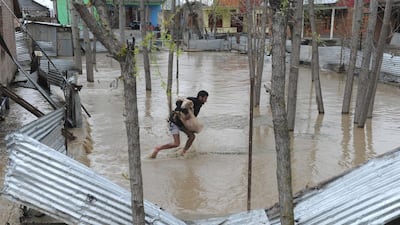SRINAGAR, INDIA // At least 15 people were buried by mudslides and hundreds of Kashmiris in both India and Pakistan forced to flee to higher ground on Monday, as heavy rain triggered flooding in the disputed Himalayan region.
Mudslides buried at least four houses in Chadoora, the worst hit area of the region where hundreds of people were killed in devastating floods last September.
Officials ordered residents along the banks of the Jhelum River to move to relief camps as the water crossed the danger threshold in Srinagar, the main city in Indian-controlled Kashmir.
More than a dozen people were trapped inside two houses that partially sank into the ground after a landslide hit Budgam district. Rescuers were digging through huge piles of mud in an effort to reach them.
The flooding after three days of heavy rain renewed fears among the tens of thousands who have struggled to rebuild after flooding six months ago destroyed thousands of homes and infrastructure worth $17 billion (Dh62bn).
For days in September, many residents were left stranded on rooftops or the upper floors of buildings as bloated livestock carcasses floated by. For weeks, heaps of garbage piled up in the waterlogged city.
“My house has been submerged,” Srinagar resident Zareena Bano said. “Last year, too, it was submerged, and today again. I feel helpless.”
Many faulted the government last year for failing to anticipate such flooding, and for taking too long to respond.
Television footage at the time showed furious locals stoning army rescuers and helicopters carrying relief to flood-hit areas of the state.
Then chief minister Omar Abdullah defended his government’s handling of the worst floods to hit the mountainous region in a century, saying no one could have foreseen the disaster’s magnitude.
Mr Abdullah’s National Conference party was ousted in elections earlier this year, a result attributed in part to voter anger over the handling of the disaster.
On Monday, prime minister Narendra Modi dispatched a special team to assess the threat and get relief efforts moving.
The government of the Indian-controlled portion of the region had issued a flood warning on Sunday night as rivers swelled and water levels approached the danger mark.
As water swirled through the streets of Srinagar on Monday morning, the city’s main Skims Medical College Hospital began shifting patients to clinics and hospitals in safer areas.
“Last year, this hospital was the first to get submerged when floods hit Kashmir. We don’t want to take any risk this time,” said deputy police commissioner Farooq Lone.
People living in low-lying areas or near the river itself were urged to move, said Javid Jaffar, the top engineer of Kashmir’s flood control department.
Landslides closed key highways, including the one linking Srinagar with Jammu district.
On the Pakistani side of the border, which was hit worse by last year’s flooding, authorities also warned residents to move away from the swelling Neelum River.
“The rain caused landslides on Sunday. In some of the areas, roads were partially damaged because of it, but the situation is normal now,” said Akram Suhail, a senior official at the disaster management authority in Muzaffarabad, the capital of Pakistan-controlled Kashmir.
No casualties were immediately reported, Mr Suhail said.
Kashmir has been divided between India and Pakistan since their independence from Britain in 1947, and both countries claim the Himalayan territory in full.
About a dozen rebel groups have been fighting Indian forces since 1989 for independence or merger of the territory with Pakistan.
Although violence has declined during the last decade, the fighting has left tens of thousands of people, mostly civilians, dead.
* Agence France-Presse and Associated Press

